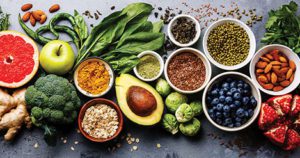By Caroline Cederquist, M.D.
 March is National Nutrition month which is very exciting. As a physician who has worked extensively with nutrition for more than twenty years, I know first-hand the role nutrition plays in health and well-being and also the role it has with improving many medical conditions.
March is National Nutrition month which is very exciting. As a physician who has worked extensively with nutrition for more than twenty years, I know first-hand the role nutrition plays in health and well-being and also the role it has with improving many medical conditions.
Nutrition is the branch of science that deals with nutrients with includes the macronutrients like protein, carbohydrates and fat, but also vitamins, minerals and other natural chemical compounds like phytonutrients which are found in food.
There are so many different diets, books and schools of thought about nutrition. The reasons there are so many include the fact that we all need to eat and that there are many variables present in each one of us that influence what the best diet is for an individual. There are some universal nutrition truths that advocates from those recommending a vegetarian diet to those recommending a more animal protein heavy Paleo type diet will agree on.
The truths are:
Limit highly processed foods and junk foods. The more food can be eaten in its natural state, the better. These days there are so many additives and chemicals added to food and the effects of all of them are not clear. It is best to minimize artificial colors, dyes and other chemicals added to prolong shelf life. For foods with a label, pick ones with fewer ingredients and ingredients are actual food and not chemicals.
Ensure a variety of colorful vegetables in your diet. Vegetables are nutrition power houses because they contain vitamins, minerals, water, fiber and phytonutrients which is what gives vegetables their color. Many phytonutrients have been analyzed and studied for their beneficial effects on health and sometimes they are used quite effectively in supplements such as resveratrol. While isolating and purifying a phytonutrient can be useful, the vegetable itself provides a combination of phytonutrients that produce effects that are greater than their individual components.
The best way to ensure a good intake of phytonutrients is to eat all the colors of the rainbow through vegetables. When we work with children, we ask them to keep a sheet where they can check off the vegetable colors they have consumed over the week and make a game of it.
After this, there is great debate as to the types and amount of protein, carbohydrate and fat that make up an ideal diet. Interestingly, the human body is very adaptable and throughout the globe people survive and thrive on diets that vary greatly from one another. Even in my practice in Florida which is a smaller section of the world, we will find that a meal plan and foods that are great for one person produce illness symptoms in others.
When we work with people who are having a hard time losing weight, an evaluation of lab work allows us to see how that individual is processing carbohydrates and other nutrients. We can tailor a meal plan based upon what is happening with each person’s metabolism. Similarly, when we work with a person who has symptoms of illness that seem related to food such as irritable bowel symptoms, migraines, joint pain or rashes, a laboratory evaluation looking for antibody reactions to specific foods can be helpful. We do find that some people have issues with “healthy foods” which for them are not increasing their health, rather they produce symptoms of illness.
There is such great interest in nutrition because it is one thing that we actually have a say in and have control of in our lives. We choose what we eat every day. If you are not feeling at your optimum health, nutrition is a great place to start as nutrients are the building blocks of your body. If moving away from a processed food diet and adding more vegetables is not enough to cause an improvement in well-being, further investigation of nutrition through lab evaluation and individualized dietary counselling may prove to be a great investment in your health.
Cederquist Medical Wellness Center
Call Today: 239-734-4486
1575 Pine Ridge Road
Suite 19, Naples, FL 34109









